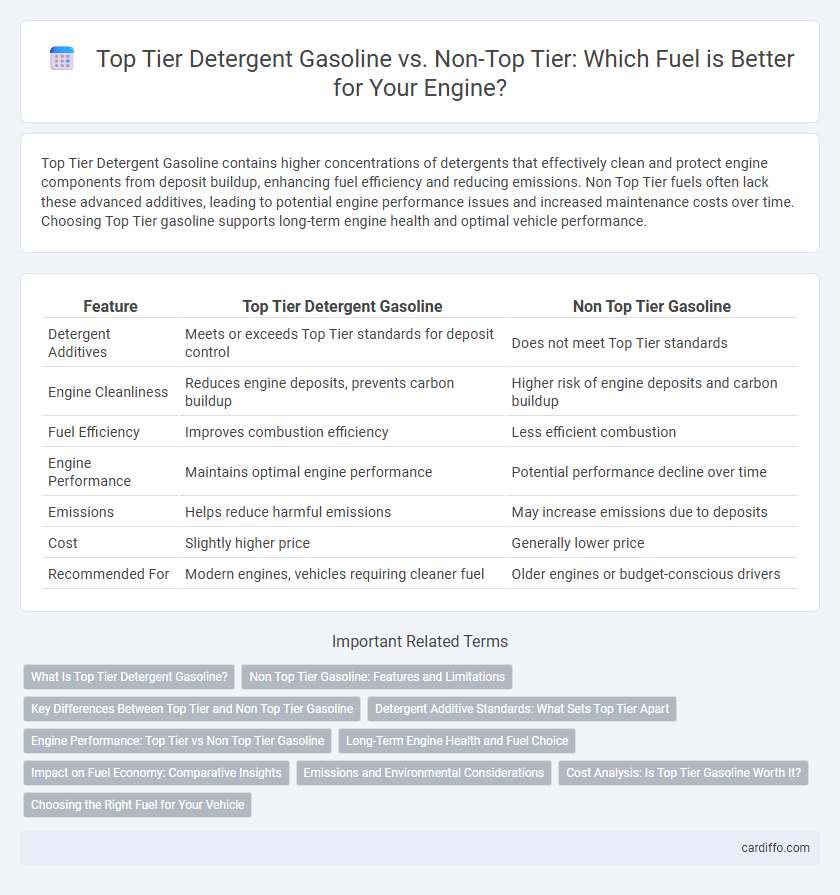Top Tier Detergent Gasoline contains higher concentrations of detergents that effectively clean and protect engine components from deposit buildup, enhancing fuel efficiency and reducing emissions. Non Top Tier fuels often lack these advanced additives, leading to potential engine performance issues and increased maintenance costs over time. Choosing Top Tier gasoline supports long-term engine health and optimal vehicle performance.
Table of Comparison
| Feature | Top Tier Detergent Gasoline | Non Top Tier Gasoline |
|---|---|---|
| Detergent Additives | Meets or exceeds Top Tier standards for deposit control | Does not meet Top Tier standards |
| Engine Cleanliness | Reduces engine deposits, prevents carbon buildup | Higher risk of engine deposits and carbon buildup |
| Fuel Efficiency | Improves combustion efficiency | Less efficient combustion |
| Engine Performance | Maintains optimal engine performance | Potential performance decline over time |
| Emissions | Helps reduce harmful emissions | May increase emissions due to deposits |
| Cost | Slightly higher price | Generally lower price |
| Recommended For | Modern engines, vehicles requiring cleaner fuel | Older engines or budget-conscious drivers |
What Is Top Tier Detergent Gasoline?
Top Tier Detergent Gasoline is a high-quality fuel certified by an industry-backed program that requires enhanced detergent additives to prevent engine deposit buildup and improve fuel efficiency. Unlike standard gasoline, Top Tier fuels meet strict standards set by automakers to protect fuel injector cleanliness and optimize engine performance. Using Top Tier Detergent Gasoline helps maintain engine health, reduce emissions, and ensure compliance with manufacturer warranties.
Non Top Tier Gasoline: Features and Limitations
Non Top Tier gasoline lacks the advanced additive packages required to meet stringent engine cleanliness standards, resulting in higher deposits on intake valves and fuel injectors. This type of gasoline often contains fewer detergents, which can reduce combustion efficiency and increase the risk of engine knocking or reduced fuel economy. Vehicle manufacturers recommend Top Tier gasoline to maintain optimal engine performance and longevity, highlighting the limitations of Non Top Tier fuels in preventing carbon buildup and corrosion.
Key Differences Between Top Tier and Non Top Tier Gasoline
Top Tier detergent gasoline contains higher levels of detergent additives that effectively clean and prevent engine deposits, improving fuel efficiency and reducing emissions. Non Top Tier gasoline lacks these stringent additive standards, often leading to increased engine carbon buildup and decreased performance over time. Choosing Top Tier fuel helps maintain engine health and extends vehicle longevity by meeting rigorous manufacturer-approved criteria.
Detergent Additive Standards: What Sets Top Tier Apart
Top Tier Detergent Gasoline contains higher levels of quality detergent additives that exceed the minimum EPA standards for fuel cleanliness, reducing engine deposits and enhancing performance. Unlike Non Top Tier fuels, which meet only basic regulatory requirements, Top Tier fuels use proprietary additive packages proven to prevent carbon buildup on intake valves and combustion chambers. This advanced detergent additive standard improves fuel efficiency, lowers emissions, and promotes engine longevity, setting Top Tier gasoline apart from conventional fuels.
Engine Performance: Top Tier vs Non Top Tier Gasoline
Top Tier Detergent Gasoline enhances engine performance by reducing carbon deposits on intake valves and fuel injectors, leading to improved fuel efficiency and smoother acceleration. Non Top Tier gasoline often lacks the rigorous additive standards, resulting in increased engine wear and lower combustion stability. Engine longevity and optimal operation heavily depend on the consistent use of Top Tier certified fuels to minimize maintenance costs and prevent power loss.
Long-Term Engine Health and Fuel Choice
Top Tier Detergent Gasoline contains higher levels of detergents that prevent deposit buildup on critical engine parts, promoting long-term engine health and maintaining optimal performance. Non Top Tier fuels lack these advanced additives, increasing the risk of carbon deposits which can reduce fuel efficiency and cause engine knocking over time. Choosing Top Tier Certified gasoline is a proactive investment in sustaining engine cleanliness and reliability, ultimately extending engine lifespan and minimizing costly repairs.
Impact on Fuel Economy: Comparative Insights
Top Tier Detergent Gasoline contains higher levels of detergent additives that effectively prevent engine deposits, enhancing fuel combustion efficiency and improving fuel economy by up to 3%. Non Top Tier fuels often lack these advanced detergents, leading to increased carbon build-up, reduced engine performance, and up to a 5% decrease in miles per gallon over time. Studies from the Coordinating Research Council demonstrate that vehicles using Top Tier gasoline maintain optimal fuel economy and lower emissions compared to those using non Top Tier alternatives.
Emissions and Environmental Considerations
Top Tier Detergent Gasoline contains higher-quality detergents that reduce engine deposits, leading to more complete combustion and lower emissions of hydrocarbons and carbon monoxide compared to Non-Top Tier fuels. Studies show vehicles using Top Tier gasoline consistently emit fewer pollutants, contributing to improved air quality and reduced environmental impact. Choosing Top Tier fuels supports longer engine life and complies better with emission standards, promoting overall sustainability.
Cost Analysis: Is Top Tier Gasoline Worth It?
Top Tier detergent gasoline typically costs about 10-20 cents more per gallon than non-Top Tier fuel but offers enhanced engine cleanliness and reduces deposit buildup, potentially extending engine life and improving fuel efficiency. Studies indicate vehicles using Top Tier fuel experience fewer maintenance issues and can sustain optimal performance, which may offset the higher upfront cost over time. Evaluating total cost of ownership, including repairs and fuel economy, often shows Top Tier gasoline as a cost-effective choice for long-term vehicle care.
Choosing the Right Fuel for Your Vehicle
Top Tier Detergent Gasoline contains higher levels of detergent additives that effectively prevent engine deposits, ensuring optimal performance and longevity. Non Top Tier fuels often lack these additives, leading to increased carbon buildup and potential engine inefficiency over time. Selecting Top Tier Detergent Gasoline enhances fuel economy, reduces emissions, and maintains cleaner intake valves, protecting your vehicle's engine health.
Top Tier Detergent Gasoline vs Non Top Tier Infographic

 cardiffo.com
cardiffo.com